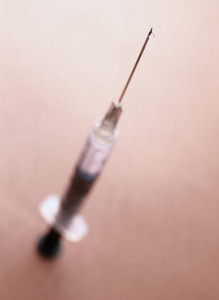The antitumour necrosis factor-alpha (anti-TNF‑a) monoclonal antibody adalimumab is used to treat a variety of chronic immune-mediated inflammatory diseases, including rheumatoid arthritis, psoriasis, psoriatic arthritis, juvenile arthritis and inflammatory bowel disease. The biosimilar MSB11022 (Idacio/Kromeya) has demonstrated physicochemical and functional similarity to reference adalimumab (Humira) in the preclinical setting. Further study in the clinical setting has established equivalent pharmacokinetics (PK) and efficacy, and comparable safety and immunogenicity for MSB11022 versus adalimumab. MSB11022 is available in three delivery formats: pre-filled syringe, vial and autoinjector. Offering a choice of devices can address patient needs and potentially improve adherence to therapy. Self-injection via pre-filled syringes may be challenging for some patients, due to issues such as needle phobia, pain-related concerns and arthritis hand pain making self-injection more difficult. The availability of alternative self-injection devices allows patients to select a device that suits their needs.
When transitioning from a pre-filled syringe to an autoinjector device, some regulatory authorities require a PK bridging study to demonstrate similar delivery of the drug product. Therefore, this phase I, randomized, open-label, single-dose study [1] was undertaken to investigate the bioequivalence and compare the safety and tolerability of a single subcutaneous injection of 40 mg of MSB11022 when delivered by either pre-filled syringe or autoinjector in healthy volunteers. Participants were randomized into the two device groups. The solution for injection in the two devices was identical in terms of the formulation and the manufacturing process. The injection depth was also comparable, meaning that the delivered dose and PK exposure was expected to be similar.
A total of 216 volunteers took part in the study. Analysis of the primary PK endpoints showed that all primary PK parameters were within the predefined equivalence margins of 80%–125%. Other PK parameters were also similar following injection via pre-filled syringe or autoinjector. While there was a slightly lower exposure to MSB11022 in individuals with higher body weights, this was consistent with both devices and with PK data for adalimumab and other adalimumab biosimilars. Two injection locations were compared, the lower abdomen versus the thigh, but this did not have a significant impact on MSB11022 exposure. The safety profile between the pre-filled syringe and autoinjector groups was comparable. In the autoinjector and pre-filled syringe groups, study device-related treatment-emergent adverse events (TEAEs) were reported by 11.3% and 13.1% of subjects, respectively. Study drug-related TEAEs were reported by 28.3% and 34.6% of subjects in the autoinjector and pre-filled syringe groups, respectively. Few subjects experienced injection-site reactions regardless of the administration method.
While the open-label nature of the study was a limitation, since participants’ awareness of the delivery mode could have affected perceptions and reporting of adverse events such as injection-site pain, PK parameters would not have been impacted by this.
In conclusion, the study demonstrated the bioequivalence and comparable safety profile of MSB11022 when administered by an autoinjector or a pre-filled syringe. Thus, administration of MSB1102 via an autoinjector represents an alternative delivery option to a pre-filled syringe in clinical practice, which may improve treatment compliance.
Conflict of interest
The authors of the research paper [1] reported conflicts of interest, including being employees of, or having received personnel fees from, PRA Health Sciences, Fresenius Kabi or Arena Pharmaceuticals Development. For full details of the authors’ conflict of interest, see the research paper [1].
Abstracted by Joëlle Monnet Gaud, Director, Biostatistics, Clinical Development, Medical and Pharmacovigilance (CDMP), Fresenius Kabi SwissBioSim, Eysins, Switzerland.
Editor’s comment
Readers interested to learn more about PK analysis of adalimumab biosimilars are invited to visit www.gabi-journal.net to view the following manuscript published in GaBI Journal:
Adalimumab biosimilar has comparable pharmacokinetics to Humira
GaBI Journal is indexed in Embase, Scopus, Emerging Sources Citation Index and more.
Readers interested in contributing a research or perspective paper to GaBI Journal – an independent, peer reviewed academic journal – please send us your submission here.
GaBI Journal Citation Impact
2.2 – CiteScore 2021 (calculated on 5 May 2022)
2.3 – CiteScoreTracker 2021 (Last updated on 6 June 2022)
Submit a manuscript to GaBI Journal
Related articles
Adalimumab biosimilars in Europe: a review
Merck Group starts phase III trial for adalimumab biosimilar
Biosimilars of adalimumab
| LATIN AMERICAN FORUM The new section of the ‘Latin American Forum’ on GaBI has been launched. The objective of this new section is to provide you with all the latest news and updates on developments of generic and biosimilar medicines in Latin America in Spanish. View last week’s headline article: Estado actual de los biosimilares de anticuerpos monoclonales aprobados en América Latina Browse the news in the Latin American Forum! Register to receive the GaBI Latin American Forum newsletter. Inform colleagues and friends of this new initiative. LATIN AMERICAN FORUM Se ha lanzado la nueva sección del ‘Foro Latinoamericano’ sobre GaBI. El objetivo de esta nueva sección es brindarle las últimas noticias y actualizaciones sobre desarrollos de medicamentos genéricos y biosimilares en América Latina en español. Vea el artículo principal de la semana pasada: Estado actual de los biosimilares de anticuerpos monoclonales aprobados en América Latina !Explore las noticias en el Foro Latinoamericano! Regístrese para recibir el boletín informativo GaBI Foro Latinoamericano. Informe a colegas y amigos sobre esta nueva iniciativa.
|
Reference
1. Sabet A, Dickerson DS, Kunina EE, et al. A randomised controlled trial comparing the pharmacokinetics and tolerability of the proposed adalimumab biosimilar MSB11022 delivered via autoinjector and pre-filled syringe in healthy subjects. Rheumatol Ther. 2022;9(2):693-704.
Permission granted to reproduce for personal and non-commercial use only. All other reproduction, copy or reprinting of all or part of any ‘Content’ found on this website is strictly prohibited without the prior consent of the publisher. Contact the publisher to obtain permission before redistributing.
Copyright – Unless otherwise stated all contents of this website are © 2022 Pro Pharma Communications International. All Rights Reserved.








 0
0











Post your comment